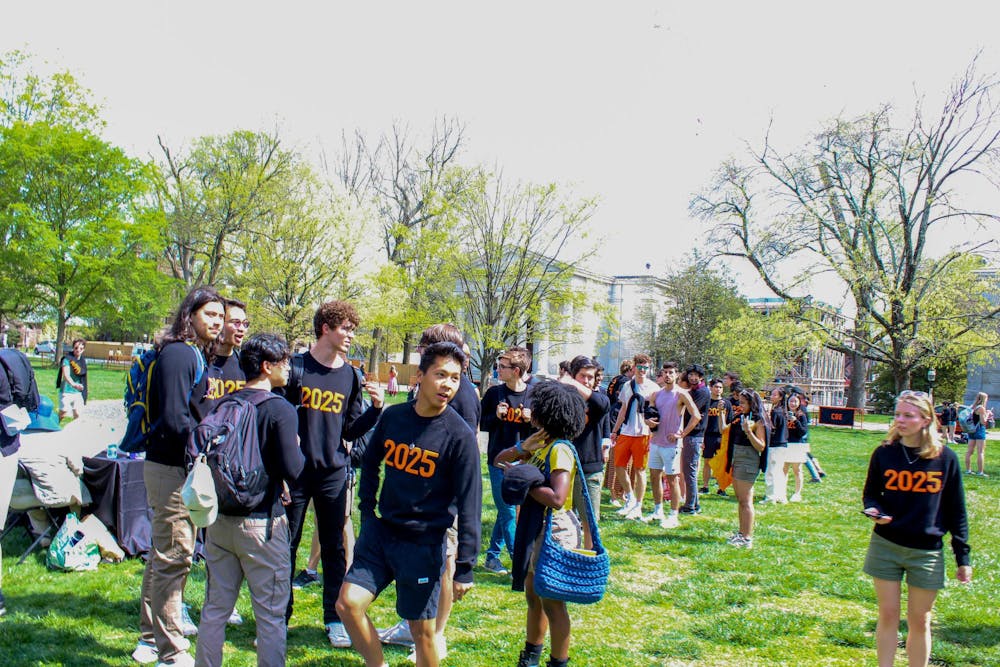Over the past three years, about two percent of respondents to The Daily Princetonian’s Frosh Survey indicated that they applied to the University as “undecided” between the A.B. and B.S.E. degrees. By the time they were about to matriculate, however, the percentage of respondents that indicated they were undecided between degree programs doubled to four percent.
Challenging courses, concentrated in the STEM field and among intro classes, often prompt students to back away from the major they intended on pursuing. Humanities and social sciences majors, however, often hold on to the same field from the time they applied to Princeton to declaration.
Engineers in particular must decide their major quickly, declaring in the Spring of their first year, sometimes before they have taken a class in their major. For engineering students, prerequisite classes are sometimes described in course reviews as “weed-out” classes, or classes designed to be challenging to scare students into dropping out of their major.
This is the case for MAT 201: Multivariable Calculus which has a 2.99 score on course reviews. Professor János Kollár has taught MAT 201 every fall since 2019 and disagrees with this assessment of it being a “weed-out” course.
“In a normal year, the percentage of students who fail the class, I believe, is less than two percent in most years,” Kollár said. “So I don’t think that we are weeding out people. Now, many people maybe will change their major in the first semester or the first year, but I think this is good. That’s why they come here the first year. The plan is that you try various things and see what you like.”
Over a quarter of students intending to major in natural sciences end up not declaring a major in this field, following a trend found by the National Center for Education Statistics. According to the ‘Prince’ 2024 Senior Survey, no natural science major was perceived as being in the top 20 easiest majors by graduating seniors in the Class of 2024. Social sciences, however, saw more students who declared than respondents that declared they would on the Frosh Surveys. According to the Senior Survey, these majors are associated with higher expected income and less perceived difficulty. Natural science majors, on the other hand, were among the lowest expected income.
“You have these high school interests and these career goals, but you’re still a kid, barely an adult,” “Introduction to Anthropology” instructor, Professor Glenn Shepard, told the ‘Prince.’ “But then you get to college and you see there’s this whole other world out there that you didn’t imagine.”
Shepard has seen cases where students become enamored in a new topic and take a new path than they expected, especially in the Anthropology department.
“I think what happens is, people, they have to do some social sciences credit so they take an anthropology class. Or someone said, ‘Oh, there’s a cool anthropological class!’ And they take it and they realize that it’s this discipline that’s so vital,” he explained. “It’s about being human and being human is always a very critical question.”
Mechanical and Aerospace Engineering (MAE) and Chemical and Biological Engineering (CBE) have consistently had more students intending to major than declare. Besides from the B.S.E. prerequisite science and math courses, MAE has seven classes required before junior year and eight or more departmental courses. CBE has seven specific required courses alongside other biology, chemistry, and advanced math courses.

Molecular Biology consistently has fewer declared students than intended.
“[A student] sort of marks down MOL, because that’s what they’ve always thought of,” said Professor of the Practice Daniel A. Notterman, a lecturer in MOL 214: Introduction to Molecular Biology.
“Then they get here and take other courses, meet other students. We want them to do that, right? We want them to come to Princeton, explore, and make a decision about life,” Notterman concluded.
Jasin Cekinmez is a contributing Data writer for the ‘Prince.’
Iman Monfopa Kone is a contributing Data writer for the ‘Prince.’
Please send any corrections to corrections[at]dailyprincetonian.com.








